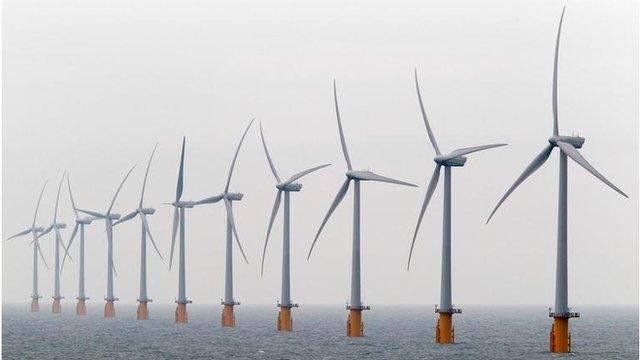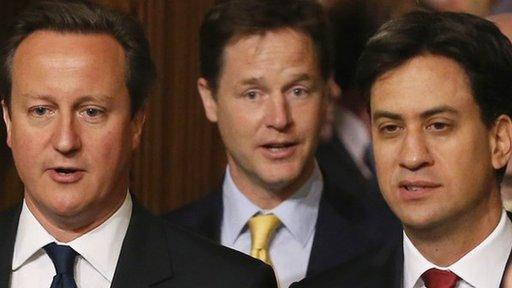Solar energy 'could provide 4% of UK electricity by 2020'
- Published
The solar industry has said it needs subsidies to compete with fossil fuels in the UK as Roger Harrabin reports
Solar power could provide up to 4% of the UK's electricity by the end of the decade, the government has said.
The plummeting cost of solar panels has caused the government to revise upwards its forecast for solar energy use, Energy Secretary Ed Davey said.
This had contributed to the government decision to end most subsidies for large-scale solar this month, he added.
But the solar industry said the cuts were a mistake and would prevent it from competing with fossil fuels.
'We need subsidies'
The price of solar panels has reduced by 70% in the past few years as subsidies in many countries created a mass market and drew in Chinese manufacturers.
In the UK this prompted the government to withdraw subsidies from large-scale solar farms - above 5MW - from the end of March.
That in turn has created a temporary solar boom as firms race to connect to the grid in the coming days.
The Solar Trades Association said as much new capacity has been installed in the first three months of this year as in the whole of 2014.
But after April it expects installations to fall 80%, because most firms will not be able to compete.
The association's spokesman, Leonie Greene, said: "We need subsidies for another few years - maybe five - before we can compete with fossil fuels in the UK.
"Only 35% of the cost of solar is the price of the panels - the majority cost is the installation and that will only come down if we have a large and thriving competitive industry in the UK.
"The government's decision to pull out subsidies is an own goal - it will delay the moment when solar can compete with fossil fuels."
'Wonderful for humanity'
But Mr Davey said recent tenders for energy contracts among different types of renewable energy companies showed that solar was ready to compete already.
Two of the lowest bids were from solar firms.
Speaking to the BBC, he said he had been "amazed and delighted" by the plummeting costs of solar power.
Mr Davey said: "This is wonderful for humanity.
"There are 300 million Indians without electricity… the effects in sub-Saharan Africa will be dramatic.
"Solar power will do to energy what mobile phones did for communication and markets."
He said he expected up to 14GW of solar by 2020 - up from 5GW at the end of 2014. That equates roughly to 1.5% of total UK annual electricity to just under 4%. He said he expected it to grow further in the next decade.
But he said solar was not swallowing too much of the renewables budget, so its subsidy needed to be cut. He said subsidy for domestic solar would continue.
Ms Greene said: "We get words - we don't get a policy. The government has created this solar rush in the UK because firms are so unconfident about policy later.
"Previously the minister Greg Barker expressed an ambition to get 20GW of solar by 2020 - we could have hit that figure if the government wasn't so blind to solar's potential."
A government spokesman said there were now 650,000 solar installations in the UK, including panels on homes.
Follow Roger on Twitter: @rharrabin, external
- Published26 February 2015

- Published14 February 2015
